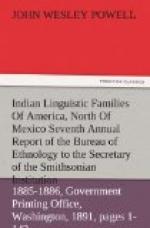[Footnote 33: Geografia de las Lenguas de Mexico, map, 1864.]
The Cotoname are practically extinct, although Mr. Gatschet obtained one hundred and twenty-five words from a man said to be of this blood. Besides the above, Mr. Gatschet obtained information of the existence of two women of the Pinto or Pakawa tribe who live at La Volsa, near Reynosa, Tamaulipas, on the Rio Grande, and who are said to speak their own language.
PRINCIPAL TRIBES.
Alasapa. Pajalate. Cachopostate. Pakawa. Casa chiquita. Pamaque. Chayopine. Pampopa. Comecrudo. Pastancoya. Cotoname. Patacale. Mano de perro. Pausane. Mescal. Payseya. Miakan. Sanipao. Orejone. Tacame. Pacuache. Venado.
COPEHAN FAMILY.
> Cop-eh, Gibbs in Schoolcraft, Ind.
Tribes, III, 421, 1853 (mentioned
as a dialect).
= Copeh, Latham in Trans. Philolog.
Soc., Lond., 79, 1856 (of Upper
Sacramento; cites vocabs. from Gallatin
and Schoolcraft). Latham,
Opuscula, 345, 1860. Latham, El.
Comp. Phil., 412, 1862.
= Wintoons, Powers in Overland Monthly, 530, June, 1874 (Upper Sacramento and Upper Trinity). Gatschet in Mag. Am. Hist., 160, 1877 (defines habitat and names tribes). Gatschet in Beach, Ind. Miscellany, 434, 1877.
= Win-tun, Powell in Cont. N.A.
Eth., III, 518-534, 1877 (vocabularies
of Wintun, Sacramento River, Trinity Indians).
Gatschet in U.S. Geog.
Surv. W. 100th M., VII, 418, 1879
(defines area occupied by family).
X Klamath, Keane, App. to Stanford’s
Comp. (Cent. and So. Am.), 475,
1878 (cited as including Copahs, Patawats,
Wintoons). Bancroft, Nat.
Races, III, 565, 1882 (contains Copah).
> Napa, Keane, ibid., 476, 524, 1878 (includes
Myacomas, Calayomanes,
Caymus, Ulucas, Suscols). Bancroft,
Nat. Races, III, 567, 1882
(includes Napa, Myacoma, Calayomane, Caymus,
Uluca, Suscol).
This name was proposed by Latham with evident hesitation. He says of it: “How far this will eventually turn out to be a convenient name for the group (or how far the group itself will be real), is uncertain.” Under it he places two vocabularies, one from the Upper Sacramento and the other from Mag Redings in Shasta County. The head of Putos Creek is given as headquarters for the language. Recent investigations have served to fully confirm the validity of the family.
GEOGRAPHIC DISTRIBUTION.
The territory of the Copehan family is bounded on the north by Mount Shasta and the territory of the Sastean and Lutuamian families, on the east by the territory of the Palaihnihan, Yanan, and Pujunan families, and on the south by the bays of San Pablo and Suisun and the lower waters of the Sacramento.




